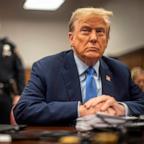Afghan Militias Take On Taliban
American troops are joining the Afghanistan militias to take on the Taliban.
March 2, 2010 -- Abdul Gafar can't bear it when the sun rises in the morning and all he has to look forward to is working in the heavy dirt of his fields and coming home to the women in his house -- peace, in other words. Gafar, a militia commander in his early 40s, grew up with a Kalashnikov in his hand the way other children grow up with Lego sets.
The quiet years here in Kunduz weren't his best years: eight insignificant winters without anything to do. There were, of course, plenty of disarmament programs, monitored by representatives of the government in the faraway capital and by international experts. Now his old AK-47 is leaning against a wall in the living room again, out in the open, and Gafar, who is Pashtun, feels strong once again.
The 60 men under his command patrol the villages around Kanam-i-Kalan, a town surrounded by fields and pastures, 18 kilometers (11 miles) northeast of the city of Kunduz. Gafar stretches and smiles: "I'm a good shot, and I even hit my mark at night. I have rocket launchers and mortar shells."
The Taliban Come to Town
Last year, at the end of March, the Taliban came to Kanam-i-Kalan for the first time. The men, in their black turbans, roared through the town on motorcycles at night, in groups of up to 20 fighters at a time. They knocked on doors, holding their Kalashnikovs in their hands, expecting the residents to prepare dinner for them.
Most of the residents of Kanam-i-Kalan are Pashtuns, like the Taliban. They remember all too well how harsh and grim life was under the strict regime of the religious zealots, before the Americans drove them out in November 2001. Most never want to live under the heel of the radical Islamists again.
The Taliban specifically targeted former comrades, recruited spies (at least two in each village) and enlisted young fighters. They levied a religious tax known as ushr, demanding 10 percent of all agricultural earnings. They eventually set up checkpoints along the roads and began checking vehicles.
The Afghan government never showed up to put an end to these activities. It was simply absent. When the situation became too dangerous, the few police officers left the town, the Afghan army was unavailable and the German military stationed in Kunduz, the Bundeswehr, was busy coping with its own problems. There was no one left to protect the local population.
Then the Taliban murdered Abdullah i-Sabaz from Khan Abad, hanging him from a tree for protesting against them. They also shot Mohammed Ismail, a policeman from the neighboring village. The noted attached to his body read: "We will kill anyone who supports the government."
"That was the turning point," says Gafar. It was also the day he opened his secret weapons depot. He had concealed it from the United Nations inspectors and the International Security Assistance Force (ISAF) for years. Now he expanded it by buying a few automatic rifles. The elders from 14 surrounding villages, representing close to 50,000 people, held a meeting. They elected commanders and gave themselves a command structure, and they trained their fighters. That was in the summer, and in late November they made their move. They told the Taliban that they could either leave or be shot. The Islamists left.




